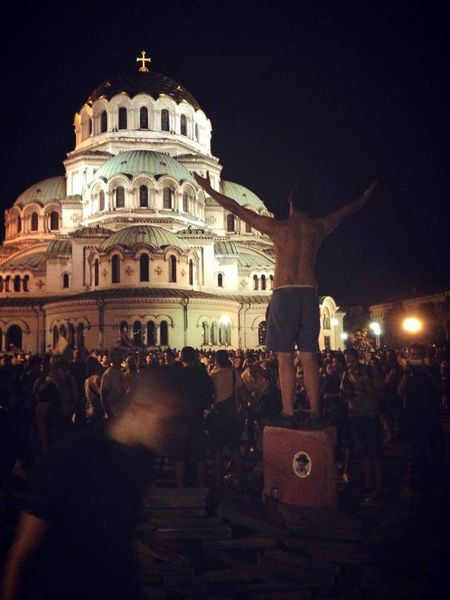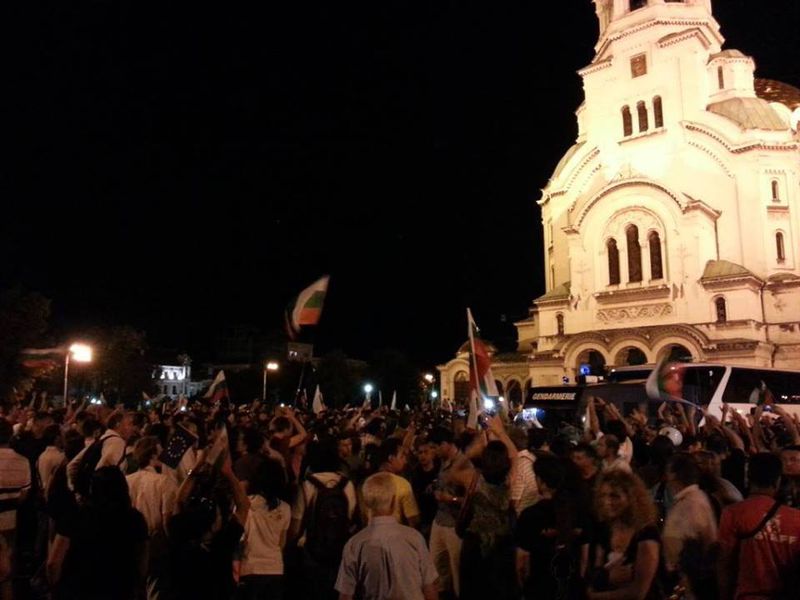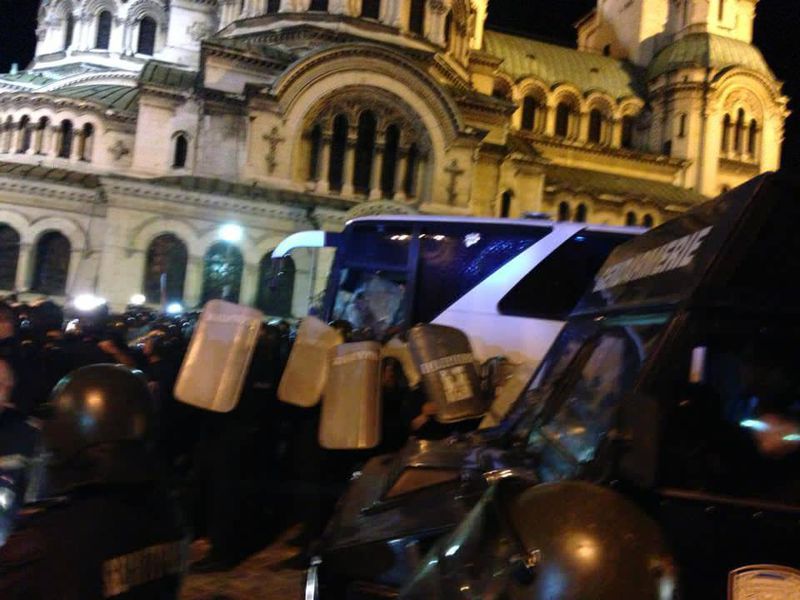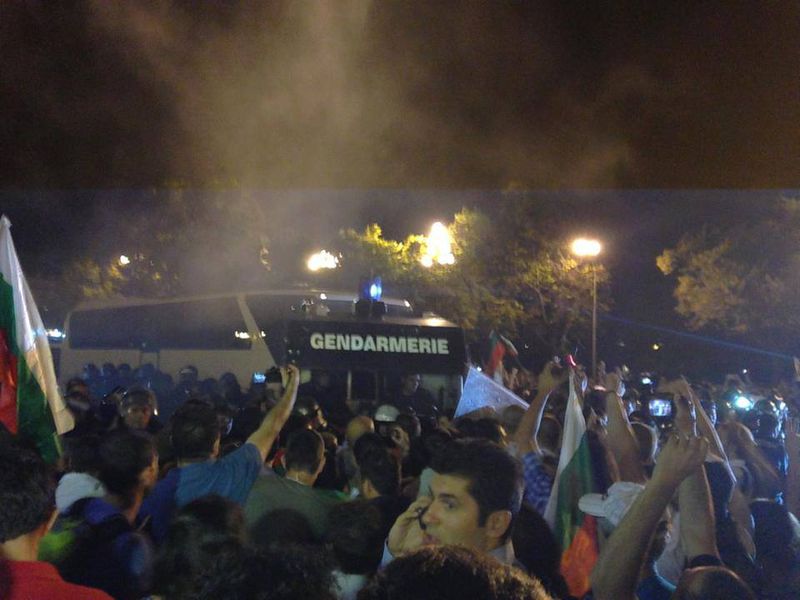Where Are European Politicians and Media To Support Democracy in Bulgaria?*
Kristina Stefanova, July 31, 2013
The 23rd of July was the peak of the long protests of thousands of Bulgarians, shouting against the oligarchy and corruption. After that night of clashes with police, Kristina Stefanova, a student abroad, sent us the text you can read bellow with which, as she writes in her e-mail, she wants to show the world what is going on in her homeland, her emotions and feelings from the events on that night. She also wrote that Bulgaria is neither Egypt nor Africa or Burma, but still it needs the support of the international community. She also provided the photos accompanying this text. We find it really emotional and sincere and that is why we have decided to publish it, so that you can read the point of view of a young Bulgarian woman about the fragile history of our nation ever since it gained its freedom from totalitarianism.
 One square, one cathedral, one parliament and the Russian soldiers’ monument in front of it. This is Sofia - my city - and Bulgaria - my country. Aleksandar Nevsky Square gathers together people celebrating every New Year’s Eve with champagne in their glasses, dancing hand in hand the Bulgarian traditional horo dance, and greeting strangers with kisses at midnight. A parliament that has witnessed a lot, including a siege 23 years ago when people were ready to fight for democracy and were willing to embrace it in their arms without expecting all that would come with it. The collapse of the communist regime in 1989 and the new beginning with a democratic regime was followed by a financial crisis, galloping inflation of the national currency, crisis of representation, downside in moral, establishment of criminal networks and new-old circle of politicians connected to the previous regime, but already under different party names.
One square, one cathedral, one parliament and the Russian soldiers’ monument in front of it. This is Sofia - my city - and Bulgaria - my country. Aleksandar Nevsky Square gathers together people celebrating every New Year’s Eve with champagne in their glasses, dancing hand in hand the Bulgarian traditional horo dance, and greeting strangers with kisses at midnight. A parliament that has witnessed a lot, including a siege 23 years ago when people were ready to fight for democracy and were willing to embrace it in their arms without expecting all that would come with it. The collapse of the communist regime in 1989 and the new beginning with a democratic regime was followed by a financial crisis, galloping inflation of the national currency, crisis of representation, downside in moral, establishment of criminal networks and new-old circle of politicians connected to the previous regime, but already under different party names.
A cathedral that gathers together Bulgarians on holy days such as Easter and Christmas; on days
when icons of saints are exhibited so people could pray for health, peace and well-being of their families and nation.
A monument just a few steps from the Bulgarian Parliament praising the Russian soldiers and the Russian Emperor Aleksandar II who sent them to Bulgaria to fight for the Bulgarian liberation from the Ottoman empire. We, the Bulgarian nation, will always appreciate and praise what the Russian people did for our small and long suffering nation! Bulgarians and Russians are brother nations and there is nothing wrong with that. Though, this is different from the relationship Bulgarian politicians have established with Russian politicians and their money after the era of communism…

Among the cathedral, the square, the Russian monument and just in front of the parliament building Bulgarian people from different backgrounds, professions and ages are asking, protesting and yesterday [July 23] even fighting for the liberation of Bulgaria. They are fighting for the release of the country from the tight grip of the government – socialists, liberals and radical right – all gathered in the same building and under the same silent union protecting their own interests, oligarchy, corruption and criminal networks that are ruling over one of the EU Member States – Bulgaria. Bulgarian people and the ones living abroad are fighting for the release of their homeland from the tight grip of those politicians who in their role of a legitimate government chose for a Head of the State Agency for National Security, a body for counterintelligence and security, a person (Delyan Peevski) who had been involved in corruption scandals and whose mother is the owner of a majority of media outlets and several online media in Bulgaria.
This appointment was defined as a mistake, just an accident that none of the politicians thought would be noticed by their own poor nation which had already been used to much worse “mistakes” like the selling of national factories during the privatisation process for dimes, criminal networks ruling over the Bulgarian seaside and small towns, corruption is spreading like an octopus over all state institutions … just one appointment would not bother our small, tired, the poorest in the EU nation. “Mistake!” – this time politicians did not expect what their error would lead to – 40 days of non-stop protests, constant energy flowing from people to people who decided this political system has to leave the same way as the communist regime collapsed 20 years ago.

There are politicians who never really left the political stage after the collapse of communism, neither did the Russian money. They are still backing up projects such as the construction of a new nuclear power plant Belene, supported by the socialist government. These politicians, as well as the ones who got their political career during the transition period via murky deals, are asked to leave … a new generation of cosmopolitan people who studied abroad, who have different values, who want to live in their own country and have a government that would care about them, about their parents, grandparents and future children.
To be a EU Member State seems not to mean a lot when it comes to democratic values. Conditionality is not a factor any more, the Cooperation and Verification Mechanism is still on but nothing more than writing reports and keeping Bulgaria out of Schengen zone can be done. This does not bother Bulgarian MPs, as MEP Tavares’s report did not bother the government of Hungary's Viktor Orbán. Even more ironically, while there are continuous protests in the country, the EU's Justice Commissioner Viviane Reding visited yesterday [July 22] Sofia as part of a long-term and well-planned in advance initiative - the Citizens' Dialogue lead by the Commission. The same evening the protesters were beaten in front of the Parliament by police while building barricades around the Parliament…
Talking about the Bulgarian and European future with a Commissioner inside and beating protesters outside – all in the same day. Where are the European politicians and media to support democracy in Bulgaria as the Bulgarian nation was one of the most pro-European countries before and after the accession in the EU? Where are the real debates in the European Parliament or the Commission about the future of Bulgaria as a Member State? The explanation from the EU is simple – the EU does not interfere in internal political issues in the EU Member States. Furthermore, the elections in Bulgaria are considered legitimate, exactly as the elections in Russia are considered legitimate. Is it not high time the EU to set up mechanisms to make sure democracy is working in its Member States, as the Hungarian and Bulgarian cases show there is no equation between being EU Member State and democracy?

One cathedral where the Bulgarian nation's faith flows in together, one square where people gather to celebrate national holidays, one Russian monument backing the Bulgarian parliament, one national parliament on the facade of which “Power Is Built On Unity” is inscribed and one nation demanding brighter future, better political alternative, people who are protesting hand in hand against political lies, corruption, ignorance and arrogance, political long historical burden…. Is faith going to disappear? Will the unity of a nation really bring change?
*The original title proposed by Kristina is Power Is Built On Unity